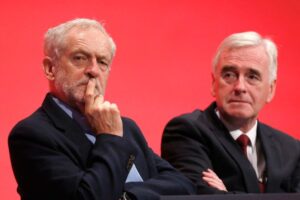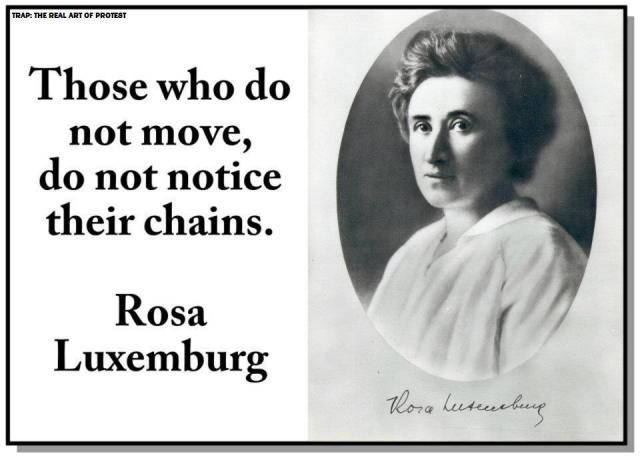 The EU referendum has brought into the open stark divisions within the Tory party, raising the real prospect of a split. This crisis of capitalist political representation is being played out as the fate of the Corbyn insurgency within the Labour Party is still unresolved. In extracts from a statement discussed at the Socialist Party’s recent congress we look at the new period that is unfolding in Britain.
The EU referendum has brought into the open stark divisions within the Tory party, raising the real prospect of a split. This crisis of capitalist political representation is being played out as the fate of the Corbyn insurgency within the Labour Party is still unresolved. In extracts from a statement discussed at the Socialist Party’s recent congress we look at the new period that is unfolding in Britain.
The speed of political developments in Britain has quickened dramatically. Last year’s Socialist Party congress document argued that “the weakening of the social base of the major parties, a process that has taken place over decades, is now reaching a tipping point. In the next period, faced with increased class struggle and social explosions, these parties – now little more than shells – can suffer serious splits or even be destroyed”. Today, both Labour and the Tories are deeply divided; it is not possible to say with certainty which will split first. Such is the Tories’ weakness that David Cameron, or even the government, could be evicted from power within months.
While the immediate reasons for the fissures in the Tory and Labour parties are different – the EU referendum for one and Jeremy Corbyn’s leadership for the other – they share a common underlying cause. Worldwide, the crisis of capitalism has undermined the social base of the traditional pro-capitalist parties. In country after country, traditional parties and politicians are increasingly undermined by populist and other forces from both the left and right. Worldwide, the capitalists are no longer able to control the political direction of the major parties to the degree that they could in the past.
Cameron rushed through the EU negotiations, cobbling together a few inconsequential crumbs that he can claim as concessions, in order to enable him to hold the EU referendum on 23 June. He hoped that by holding it quickly, he would avoid it becoming a referendum on his rule and the Tory government. However, this is far from guaranteed to work. Like the 2014 Scottish independence vote, it is possible that the EU referendum could become a means by which many workers express their rage at continued austerity. We have to pose the referendum in those terms, explaining that voting ‘Leave’ could lead to the possibility of getting the Tories out.
Referendum Splits
A clear majority of the British bourgeois are in favour of remaining within the EU. They fear that Brexit will lead to foreign capital, which invests heavily in the finance sector of the City of London and looks on Britain as a springboard for investment in Europe, relocating to the continent. The EU, with over half-a-billion people, is one of the biggest markets in the world, if not the largest, and takes over half of Britain’s exports. There are a minority of finance capitalists – particularly the smaller hedge funds – that favour exit from the EU, dreaming that it will lead to an even less regulated ‘Square Mile’. The view of this minority of the capitalist class has the initial support of nearly half of Tory MPs and the vast majority of Tory party members. That the opinion of the big majority of the capitalist class on this important issue is so severely underrepresented in Britain’s traditional capitalist party is a very clear example of the increasingly dysfunctional character of capitalist politics.
This could reach crisis point in the coming months. If Cameron loses the referendum he would be politically finished and would probably have to resign very quickly. It is possible that the government would fall and a Corbyn-led Labour Party could come to power, but there are still huge roadblocks to this, not least the determination of the right wing of the Labour Party to prevent it. Losing the EU referendum would also be likely to lead to a new independence referendum in Scotland. Cameron could still go down in history as the Tory prime minister responsible for the breakup of the United Kingdom!
Even if he wins the EU referendum, particularly if only narrowly, the Pyrrhic victory could very quickly turn into its opposite with voters punishing the Tories for austerity in the same way as Labour has been punished after the indyref in Scotland. A split in the Tory party could become unstoppable. Even prior to the referendum, it is only the first-past-the-post electoral system which is holding the Tory party together. Given the profound divide that also exists in the Labour Party, a fundamental realignment of British politics could not be ruled out, with the pro-EU Tories uniting in a new party with the right wing of the Labour Party, possibly also involving the remnants of the Liberal Democrats.
If Jeremy Corbyn had been prepared to lead a socialist, internationalist campaign for exit, it could have gained a huge echo. It would also have been able to reach out to important layers of working-class UKIP (UK Independence Party) voters, most of who are to the left of Corbyn’s election programme on many issues. Instead, one of his first major concessions to the Labour right was to agree to back the ‘Remain’ campaign unequivocally, potentially abandoning millions of workers to UKIP. The Trade Unionist and Socialist Coalition (TUSC) therefore has a vital role to play in ensuring that there is a pro-working class, internationalist campaign for exit.
A Different Kind of New Formation
Alongside predicting the crumbling of the establishment parties, last year’s document also stated that “the rapid development of new parties” would be on the agenda. We drew a comparison with Podemos in Spain erupting onto the scene and topping the polls within eight months and argued that “we could see similar developments in Britain”. That has been borne out, albeit in an unexpected form, by the election of Jeremy Corbyn as leader of the Labour Party.
Having scraped onto the ballot paper for the leadership election, Jeremy Corbyn became a focal point for hundreds of thousands of opponents of austerity. Ironically, Labour’s new electoral system, introduced by Ed Miliband to remove the last vestiges of trade union power from the party, meant that those enthused by Corbyn could sign up for ‘the price of a pint’ (£3) to vote for him. It was this new layer, combined with some ‘returners’ to Labour, which swept Corbyn to a landslide victory. As we have stated from the beginning, there are now two parties in formation within the shell of the Labour Party: the pro-capitalist rump which has dominated the Labour Party for decades and still has a grip on the machine and Parliamentary Labour Party (PLP); and a new, anti-austerity, anti-war party around Corbyn.
We have long predicted the development of such a new formation. We considered it more likely to come into being from forces outside of the Labour Party – as has been the trend in most countries – given its transformation into a capitalist party. The lack of democracy in the Labour Party and growing levels of working-class alienation from it meant a movement within the party structures was not the most likely scenario. Nonetheless, we have no fetish about the route by which the crisis of working-class political representation would be solved and have never excluded the possibility of Labour swinging left. As long ago as 2002 we argued: “Under the impact of great historic shocks – a serious economic crisis, mass social upheaval – the ex-social democratic parties could move dramatically towards the left”. (Socialism Today No.68, September 2002)
Does this invalidate our analysis that Labour had been transformed in the 1990s into a capitalist party, rather than, as it previously was, a capitalist workers’ party – with a leadership which acted in the interests of the capitalist class but with a mass working-class base able to put pressure on the party leadership? Not at all. The class character of a party is not fixed in stone but can change under the impact of major events. Workers’ parties can be formed out of splits from capitalist parties – such as when PASOK in Greece was formed out of a split from the bourgeois ‘Centre Union’, or the MAPU in Chile that became part of Salvador Allende’s Popular Unity but which originated in a split from the capitalist Christian Democrats.
For a historical period, Labour became a party which was a completely reliable tool for the capitalist class. This was reflected not only at the top of the party but also at its base although, of course, a few remnants of the past still remained. Margaret Thatcher famously declared that her greatest achievement was Tony Blair and New Labour, and the capitalist class understand that her achievement is now under threat. But it would be premature at this stage to characterise the Labour Party once again as a bourgeois workers’ party. It is more accurate to say that it is two parties – a capitalist party and a potential workers’ party – within one.
Labour’s fate still unresolved
It is not possible to predict the outcome of the civil war that is taking place within Labour. Jeremy Corbyn was elected on a surge of goodwill, which he largely still has. However, he is facing determined resistance from the unreconstructed right wing, which still controls the party machine. Even highly undemocratic structures like the ‘compliance unit’ remain wholly intact. Our role in this situation is primarily, as Trotsky said in 1932, ‘not speculation but a strategy for action’. We trenchantly oppose the right. We give critical support to Jeremy Corbyn, while seeking to push him energetically to the left, and combating any hesitation or retreat on his part. We recognise that this battle will not take place exclusively in the Labour Party, but that the struggles of workers against cuts and austerity, in which we play a central role, are in many ways more crucial.
While Corbyn’s programme is, objectively speaking, barely reformist, the capitalist class does not want to run the risk of a Labour government which intends to take any measures in the interests of the majority, as this would awaken an appetite for far more radical measures. They particularly fear this given the likelihood that the next general election will take place against the background of a new, deeper phase of the economic crisis. If they cannot ensure Corbyn is overthrown, it is possible that the capitalist class will shift its position on proportional representation – suddenly noticing the undemocratic character of the first-past-the-post system – in order to try and prevent a left-led Labour government coming to power.
It is not a simple matter for them to overturn Corbyn, given the size of his mandate. This in the end reflects the lack of a social base for the Labour right. They may dominate the PLP but around what policies are they going to be able to mobilise an ‘anti-Corbyn’ movement? Keeping tuition fees? Private ownership of the railways? Support for another disastrous imperialist intervention into the Middle East? To ask the question is to set out the difficulty they face. Today is a completely different world to when New Labour came to dominate the party. Not least that, since then, workers have experienced in practice what Blair’s ‘third way’ actually meant through thirteen years of Labour government.
New Labour’s ‘prince of darkness’, Peter Mandelson, has commented on the paucity of social forces available to the right wing in the ongoing civil war. He has, however, pointed out two forces to look towards: “While the trade unions can no longer be relied upon to rescue the party as they helped Kinnock do, it would be a mistake to disregard them entirely, or Labour’s legions in local government, who are a bigger force for sense and moderation in the party than at any time in the recent past”. (Guardian, 31 December 2015) There is no doubt that the majority of Labour councillors form a bureaucratic caste which is a bulwark for the right. Only 450 of the 7,000 Labour councillors supported Corbyn, a smaller percentage than of the MPs.
The Trident Test
As far as the trade unions are concerned, Mandelson is undoubtedly correct that right-wing leaders would be keen to assist in the overthrow of Jeremy Corbyn. But this will be not be easy for them without undermining their own base among trade unionists. Dave Prentis, general secretary of UNISON, felt he had no choice but to back Corbyn in the election campaign – not least because he was standing for election himself. Now formally ‘re-elected’, although facing an investigation into electoral malpractice, Prentis will have to be cautious about openly undermining Corbyn. Nonetheless, it is revealing that the campaign manager for Liz Kendall – the most right-wing of the Labour leadership election contenders – has been appointed to a senior union position.
Of course, this does not mean that the right will not be able to win some support – assisted to the utmost by the capitalist class, and by relying on a more conservative section of the working class. The proposed renewal of the Trident nuclear weapons system is one issue around which they are attempting to mobilise, backed by right-wing trade union leaders who are playing on defence workers’ genuine fears about jobs. Corbyn has correctly promised investment in alternative jobs for Trident workers, but to put a convincing case that can win workers in the industry it is necessary to go further than he has. This means calling for the nationalisation of the companies concerned and working out a concrete alternative plan of production, as the Lucas Aerospace workers did in the 1970s. At the same time, opinion polls have generally shown a substantial part of the population opposing the renewal of Trident. The idea that Trident is a waste of money and the billions it would cost could be better spent on public services is potentially very popular.
Like the bombing of Syria, a central part of the reason that the Labour right and sections of the capitalist class are so irate over Trident is because they see it as a means to strike a blow against Corbyn. Conversely, they understand that a victory for Corbyn on either issue would strengthen the anti-austerity and anti-war movement. Neither issue is a matter of military principle for the capitalist class. Rather, they are a matter of prestige for British capitalism on the world stage, with the possession of nuclear weapons securing a place at the top table of the capitalist powers, for example at the UN Security Council.
It is true that, once Cameron had declared he wanted Britain to take part in the bombing of Syria, it would have been a blow to the prestige of British capitalism if he had once again been unable to accomplish it. Nonetheless, much of the capitalist class in Britain are – at best – doubtful about the merits of adding Britain’s puny contribution to another doomed intervention in the Middle East.
Equally with Trident, when Blair first agreed the renewal in 2007, many capitalist commentators, including a Financial Times editorial, questioned the point of doing so. Now, however, the FT is fulminating at Corbyn’s opposition to Trident, calling for the Labour right to refuse to serve in his shadow cabinet. Grinding their teeth, the editorial (7 January) declared: “By reopening the question of the nuclear deterrent and empowering the hard left, he is reaching way back to the 1980s, when unilateral disarmers controlled the party until being ground down, constituency by constituency, town hall by town hall”.
It is one thing for the FT to identify the problem for the capitalist class but it is another to find a viable way forward for their supporters within the Labour Party. They are currently enormously weakened in the face of Corbyn’s support and cannot see an easy way forward. Of course, over time, particularly if Corbyn consistently retreats in an attempt to pacify the right wing, they hope that his supporters will become demoralised and demobilised and they will be able to push him aside.
A Split by the Right?
If they feel they have no other choice, the right wing could resort to its ‘plan B’ to split to found a new party. In the immediate aftermath of Corbyn’s victory, Sunday Times journalist Adam Boulton reported: “The first hope of the Blairites and Brownites appalled by Corbyn’s election was that all but a tiny rump of Labour’s 232 MPs would defect to a new party in such numbers that they would become the official opposition. Backers were prepared to put up millions of pounds for the new party, provisionally called the Progressive Democrats, which would have left the Labour Party behind with its debts”. They would not do this lightly, however, as it would mean handing the Labour label to a new radical left party, and also because they fear a right split from Labour would suffer the fate of the Social Democratic Party (SPD). However, these factors would not prevent them if their plan A failed. Even the SDP, from the point of view of the capitalist class if not the politicians who pinned their careers to it, was not a failure as it played an important role in ensuring that Labour lost the 1983 general election.
The civil war in the Labour Party cannot continue indefinitely without events tipping one way or the other. Every incident, no matter how minor, results in a new crisis, worse than the one before. Nonetheless, it cannot be excluded that the deadlock between the two sides can continue for a period if the right cannot find a way forward and the left fails to effectively mobilise its support. What is excluded, however, is an end to the civil war and crisis for as long as the deadlock continues.
Limitations of the Left
A critical factor is the extent to which Jeremy Corbyn and his supporters mobilise and build on the anti-austerity movement which thrust him into the leadership. Unfortunately, up until now that has not been done effectively. On the contrary, the general tendency has been to try and win the right over by making concessions to it. This will not pacify but embolden the right while, eventually, demoralising and demobilising Corbyn’s supporters.
Compared to the majority of the Labour left of the late 1970s and early 1980s, the tendency in the Corbyn camp – particularly the self-appointed leaders of Momentum – is to move to the right very quickly under pressure. This is ultimately a reflection – shown on a much broader stage by the election and then capitulation of the Syriza leadership in Greece – of the character of the first wave of left reformism in this new era. On the one hand, the popular support for them is still largely passive and unorganised, and is based mainly on a more petit-bourgeois layer. This means that the pressure from below is not yet comparable with the pressure from the organised working class that existed in a previous period.
At the same time, the pressure from the capitalist class is greater than ever. Objectively speaking, a reformist approach is completely utopian in this era. This means that reformist movements and parties will be inherently unstable. However, this does not preclude the development of more left-wing and determined strands of reformism in the future. The mass of the working class will not go straight from their current consciousness to drawing revolutionary conclusions. At first, they will test out the seemingly easier road of reformism in practice. In the course of this experience, workers’ movements can exert more intense pressure on reformist leaders to go much further in the fight to defend workers’ interests than has been the case up until now.
It is a real possibility that continued retreat by Corbyn could lead to the dissipation of the new party that has begun to form around him, and to his eventual return to the Labour backbenches. Even this worst-case scenario would not mean that everything went back to ‘how it was before’. On the contrary, the idea that an anti-austerity party would be popular would have been firmly established. Many who had been enthused by Corbynism would draw the necessary conclusions about the need for a new party. In this situation, TUSC and our party could have a very important role to play. However, this scenario is very far from certain. It is likely that any attempt to oust Corbyn – particularly if the right wing acts prematurely – could lead to a new upsurge from below in support of him. In this situation, the momentum towards a rupture in the Labour Party would become unstoppable.
A New More, Unstable Era
Traditionally, the pace of politics in Britain has been drawn-out. The working class, while very determined once in action, has also been slow to enter the struggle. Those ponderous traditions ultimately reflected the power and stability of British capitalism. They are now in the process of being burnt away by the reality of British capitalism in the 21st century. Increasingly, we have to be prepared for sudden, and sometimes unexpected, developments as workers’ anger at austerity searches for a viable outlet. This can mean sudden new political developments but also explosive struggles where workers find an effective means to fightback. This can include social movements (like the water charges movement in Ireland) particularly where workers feel blocked on the industrial front by the right-wing trade union leaders.
The increasingly southern European character of British politics also means that we will have to be much more flexible in our own tactics. In the last six months, we have shown our capacity to respond effectively to this new era. However, that has only been the start. The process towards the fragmentation and reconfiguration of politics, which we described in the last perspectives document, will continue.
It is not possible to predict what the exact outcome of the battles will be, within either Labour or the Tories. Beyond drawing general conclusions about the shallow social base for capitalist parties and the resulting instability of capitalist politics, the most important conclusions we have to draw is on the growing radicalisation of important sections of the working class and young people. The movement which thrust Corbyn into the leadership of the Labour Party demonstrates beyond doubt the potential for a new mass party of the working class on an anti-austerity programme. At the same time, his election has fuelled a wider debate on socialist ideas – what they are and how they can be achieved – which is a very important step forward.
At this stage, the concept of socialism is very hazy among those who have been galvanised by Jeremy Corbyn. However, the experience of Corbynism, combined with participating in the struggle against austerity, can lead many thousands of new activists to conclude not only that socialism is possible but that to achieve it requires a party such as ours, organised around a clear programme for the complete transformation of society.



